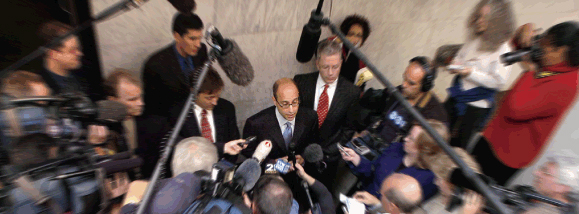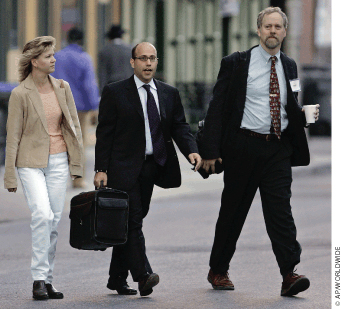
As the lead attorney for the plaintiffs in the Dover school-board case, law alumnus Eric Rothschild demolished the arguments of intelligent design’s proponents—including one fellow Penn grad.
By Peter Nichols
It was day three of the Kitzmiller v. Dover trial. Eleven parents had brought a lawsuit in federal court challenging the constitutional validity of a Dover school-board policy critical of evolutionary theory. The board’s new approach to teaching science offered the district’s biology classes “an explanation of the origin of life that differs from Darwin’s view.”
Now the parents all sat in a row of chairs as their team of dark-suited attorneys huddled with legal assistants who’d wheeled hand trucks stacked with boxes of files, books, and documents into U.S. Middle District Court in Harrisburg, Pennsylvania. Technical assistants were setting up laptops loaded with “evidence,” text from publications and remarks that would be projected onto a screen as the lawyers built their case—fact by fact and expert by expert—against the Dover board.
One of the parents, Barrie Callahan, a stay-at-home mom with an impossible mop of curly blond hair, was reading a newspaper with a headline that screamed, “The worst job: Teaching science in Dover.” The article had a photo of Bryan Rehm, a one-time science teacher at Dover High School. He and Callahan had testified the day before.
Rehm had recounted how teachers came under pressure from board members not to teach “monkeys-to-man” evolution. When he tried to explain how fundamental the theory is to modern science and how solid its acceptance is among scientists, he was dismissed as “an atheist,” despite being a churchgoer and bible-school teacher. He would eventually resign.
Callahan, a former board member, told the court of a June 2003 retreat with Alan Bonsell, then head of the curriculum committee, who said he didn’t believe in evolution and wanted biology instruction to balance creationism and evolution “50/50.” She also testified that another—and especially pugnacious—board member, William Buckingham, had complained at a June 2004 meeting that a new biology textbook being considered was “laced with Darwinism.” He later declared, “Two thousand years ago, someone died on a cross. Can’t someone take a stand for him?”
Later that year, in October 2004, after months of rankling and divisive community debate, the Dover school board did take a stand.
“What the board did was add creationism to the biology curriculum under its new name: intelligent design,” said Eric Rothschild L’93, in his opening statement at the trial. Intelligent Design (ID) posits a “master intellect” behind the screen of nature and maintains that the complexity of life cannot be explained by the random operation of genetic mutation and natural selection. That discovery, ID proponents say, is the fruit of scientific inquiry and represents the latest challenge to evolutionary theory by a small band of upstart scientists. And while the data supporting a design is clear, they add, it is insufficient to identify the designer that brought the world to life. Those claims would come under close scrutiny in this hearing.
Rothschild, a Philadelphia lawyer and partner with the big firm Pepper Hamilton, was lead counsel for the plaintiffs. His job was to pull together and make sense of all the facts and expert testimony to persuade federal judge John E. Jones III, a Republican appointee of President Bush, that the Dover school board had violated the First Amendment’s Establishment Clause, which throws up a “wall of separation” between church and state. Rothschild headed a team of attorneys from his own firm and from the American Civil Liberties Union and Americans United for the Separation of Church and State.
Rothschild has rectangular glasses and a quick, inverted-triangle smile. His specialty is commercial litigation—complicated, multimillion-dollar contract disputes between insurance companies and the corporations that insure them. As an associate, he cut his trial-attorney teeth on Pepper’s Three Mile Island litigation, where he learned to absorb lots of science and use it to try cases. “The legal process is not identical to the scientific process, but it does really put whatever proposition you are advocating under the microscope,” he said at an interview in Pepper’s dark-wood and polished-brass-and-marble offices. “Cross-examination is a pretty remarkable engine for finding things out and exposing weaknesses in an argument.”
In 1999, when the Kansas Board of Education barred evolution from the state’s science classrooms, Rothschild got in touch with the National Center for Science Education. “If you need lawyers,” he told them, “here I am.” NCSE tracks anti-evolution activity and is a clearinghouse for scientific and legal information and advice on keeping evolutionary theory in the public schools and creationism out. He joined the group’s legal-advisory panel. As the dispute in Dover boiled over, NCSE and other watchdog groups began to get calls from members of the community looking for representation. “I wanted to be part of that,” Rothschild says. “I wanted the firm to be part of that.” At his urging, Pepper Hamilton put its formidable resources behind Kitzmiller v. Dover as a pro-bono case.
“I’ve always felt comfortable as a member of a religious minority in this country,” says Rothschild, who is a practicing Jew and a product of the public-school system. “Different religious groups have a comfort level here that I think is, to a large extent, attributable to the fact that we don’t force religion on each other or favor one religion over another.
“This issue of separation of church and state is one that I personally take most seriously. The modern interpretation of that principle has been one of the healthiest aspects of our constitutional democracy. I like to quote what Justice [Sandra Day] O’Connor said in the McCreary opinion: ‘Why would we trade a system that has served us so well for one that has served others so poorly?’
In the courtroom, Rothschild is calm and confident, even a little eager. White shirt; charcoal suit; dark-plum tie. He pours bottled water into a Styrofoam cup, lifts a bulky three-ring binder filled with questions on tabbed pages, and carries both to a podium at the center of the courtroom. The questions map out a plan of attack, but he’s ready to improvise when a response suggests a new opportunity or exposes a weakness. “He is super smart, very thorough, and quick on his feet,” remarks co-counsel Vic Walczak, legal director for Pennsylvania’s ACLU chapter.

A survey carried out by the Pew Research Center for the People & the Press just before the trial began last fall showed that 42 percent of Americans embrace the Genesis account of creation as gospel and regard evolution with a skeptical eye. Although nearly half the population accepts that living things evolved over time, 18 percent of those believe evolution is guided by the divinity rather than natural selection. In the courtroom gallery, a reporter from Germany is asked what Europeans make of the trial. She rolls her eyes and whispers, “We thought this had all been settled long ago.”
One hundred forty-six years after the publication of Darwin’s revolutionary theory, 80 years after the Scopes “monkey trial,” 18 years after the Supreme Court ruled the teaching of creationism in public schools unconstitutional, Rothschild is stepping forward to face down the latest assault on evolution.
On this, the third day of the trial, Rothschild guides Professor Robert Pennock, a philosopher of science from Michigan State University, through hours of question-and-answer testimony.
“How do philosophers of science distinguish between science and non-science?” he asks.
“Philosophers of science focus on what scientists do,” responds Pennock, who is young and bearded and has a gee-whiz enthusiasm for his subject. “Science is a practice that deals with examining questions about the natural world, giving explanations about the natural world in terms of natural law, and offering hypotheses that can be tested against the natural world.”
Rothschild looks intently at the expert witness, giving small listening-nods as though affirming the points he makes.
Pennock is the author of Tower of Babel: The Evidence Against the New Creationism. He tells the court he has studied creationism for a long time, and intelligent design since it appeared on the American scene 15 years ago. Creationism, he explains, “is a rejection of evolution as science understands it.”
“Is intelligent design creationism?”
“It’s a form of creationism … They hold that you cannot have a natural explanation of biological complexity, and you need to have some special intelligence … that intervenes to produce [the natural world].”
Judge John T. Raulston, who presided over the Scopes trial, allowed only testimony on whether John Scopes had violated the law of Tennessee—he did—which made it a crime “to teach any theory that denies the story of the Divine Creation of man as taught in the Bible, and to teach instead that man has descended from a lower order of animals.” The Kitzmiller judge is hearing expert testimony from philosophers, biologists, paleontologists, biochemists, education experts, theologians, and others. He wants to clarify not just whether intelligent design is religion, and hence unconstitutional, but if it is even science at all.
“Do you have an opinion about whether intelligent design is science?” Rothschild queries.
“Science is probably most characterized by its way of coming to conclusions,” Pennock answers. “It’s not so much the set of specific conclusions that it comes to but the way in which it reaches them … It gives natural explanations about the natural world. Intelligent design … wants to reject that. And so it doesn’t really fall within the purview of science.”
The resolution passed by the Dover school board said it was intended to make students “aware of gaps/problems in Darwin’s theory.” New guidelines required that a four-paragraph disclaimer be read to ninth-grade biology classes before they undertook the study of evolution, which is mandated by state standards. The statement cautioned that “[evolutionary] theory is not a fact” and that “gaps in the theory exist for which there is no evidence.” Intelligent design was offered as an alternative “explanation,” making Dover the first school district in the country to place it before students. Sixty copies of the ID book Of Pandas and People had been donated anonymously to the district, and students were informed that the “reference book” would be available in the high-school library. “With respect to any theory,” the statement advised, “students are encouraged to keep an open mind.”
Lawyers for the board have stressed that the curriculum add-on was a “modest change” aimed at improving science education and promoting critical thinking. Intelligent design would not be taught as a lesson nor would questions about it be allowed, and students were permitted to leave the classroom while the statement was read.
It turned out that it was the teachers who chose to “opt-out.” They refused to read the disclaimer, citing their code of professional conduct, which did not permit teachers to “knowingly misrepresent subject matter.” Intelligent design, they told the board repeatedly, is not science.
In January 2005, a school administrator stepped in to the classroom to read the one-minute statement to more than 40 students and then stepped out. No questions. No discussion. The teacher returned to present the Darwin lesson, and the students were left to wonder if perhaps the gaps and problems had something to do with God. Many of the parents had no doubts. By that time, the lawsuit against the board had already been filed.
More than a year of public meetings that led up to the curriculum change were well documented by the parents and teachers caught up in the dispute, which had also been closely followed and reported by two York County newspapers. Testimony from Barrie Callahan and other witnesses told how Buckingham and Bonsell called for “creationism” to be part of science instruction in Dover.
On the stand, Buckingham countered that neither he nor anyone on the board had ever used that word. “We’d say intelligent design and they’d print creationism,” he complained of the newspapers. In court, Pepper attorney Stephen Harvey ran a video of a Fox 43 television news report that showed Buckingham wearing a cross-and-American-flag lapel pin. In it, he told the interviewer, “My opinion [is that] it’s OK to teach Darwin, but you have to balance it with something else, such as creationism.”
For advice on how to make science education better for Dover’s kids, Buckingham sought out the Thomas More Law Center, a public-interest law firm that refers to its work as “our ministry” and styles itself “the sword and shield of people of faith.” President and chief counsel Richard Thompson told him that the popular ID book Of Pandas and People would provide the 50/50 balance he was looking for and that the center would back the board in case of legal action. Talk of creationism disappeared from the meetings, and the board began to push for intelligent design.
In public and in sworn depositions, Buckingham and Bonsell repeatedly asserted that they did not know where the district’s ample supply of Pandas had come from. But under Harvey’s questioning, Buckingham specified that, though he never exactly “asked” for money, he did tell the congregation at Harmony Grove Community Church that “there is a need, if you want to help.” He collected $850 and wrote a check to Bonsell’s father, who then purchased and donated the books.
“There are consequences for not telling the truth,” Rothschild warned in his summary argument. He would be proved right. The Kitzmiller trial would show that the pattern of bad faith and cover-up extended beyond the fumbling intrigues of a small-town school board.
Intelligent design can trace its lineage across three generations of failed attempts to supplant or dilute evolution in the classroom. Early in the 20th century, state legislatures made it illegal to teach Darwin’s ideas. The Tennessee law at issue in Scopes is an example. Those laws were eventually ruled unconstitutional by the Supreme Court in Epperson v. Arkansas (1968). Religious proponents then tried to introduce “creation science” into schools, arguing that evidence can be found supporting the biblical account of creation and that it should be taught in science classes alongside evolution. The “balanced treatment” statutes that followed were struck down by the high court in Edwards v. Aguillard (1987), which cited those laws’ “preeminent purpose” of advancing “the religious viewpoint that a supernatural being created mankind.” The landmark ruling left open the door for teaching legitimate “scientific theories … with the clear secular intent of enhancing the effectiveness of science instruction.” Not long after Edwards, intelligent design stepped through that door.
In her testimony, Professor Barbara Forrest, a philosopher at Southeastern Louisiana University, explained that intelligent design is just another word for creationism. Forrest is coauthor of Creationism’s Trojan Horse, which chronicles the tactics of the ID movement. She told the court that biology professor Dean Kenyon, while advocating for creation science in the Edwards hearing, was also at work on a creationist textbook that would be published in 1989 as Of Pandas and People.
When the Supreme Court outlawed the teaching of creationism, the Foundation for Thought and Ethics, publisher of Pandas, resolved the setback by deleting references to creator and creationism and replacing them with designer and intelligent design. The rest of the text remained mostly the same. As a legal strategy for getting around the Edwards decision, Forrest explained, the ID movement had scrubbed references to God, creationism, and the Bible from public pronouncements and put in their place an unnamed designer whose identity, they said, could not be ascertained by scientific investigation. Comparing a pre-Edwards manuscript of Pandas with the published edition, she found about 150 replacements, demonstrating how the ideas of creationism remained in the book even as the words that named it were cut and intelligent design(er) was pasted in. “They’re virtually synonymous,” she maintained.
That “semantic subterfuge” was soon undermined by pronouncements of the ID founders themselves. Forrest pointed to the movement’s strategic plan and main fundraising tool, known as The Wedge Strategy. “The proposition that human beings are created in the image of God is one of the bedrock principles on which Western civilization was built,” it began. The document, which appeared online in 1999, decries how science’s “materialistic conception of reality eventually infected virtually every area of our culture” and goes on to lay out the aim of the ID movement: “Design theory promises to reverse the stifling dominance of the materialist world view and to replace it with a science consonant with Christian and theistic convictions.”
At the trial, lawyers from the Thomas More Law Center put Dr. Michael Behe Gr’78, one of the movement’s leading lights, on the witness stand. His job was to convince the judge that intelligent design is backed by real science. Behe is a professor of biochemistry at Lehigh University, where he writes research papers on the structure of DNA. “Intelligent design is a scientific theory that relies on physical, empirical, observable evidence in nature, plus logical inferences,” he explained to the court.
Behe is the author of Darwin’s Black Box: The Biochemical Challenge to Evolution, an ID best-seller in which he maintains that living cells are packed with molecular machinery that is “irreducibly complex.” These intricate mechanisms, he argued, are made up of a “purposeful arrangement of parts” from which we can infer “design,” just as we assume that a human-made device was conceived by a designer who had intelligence.
A living structure whose complexity is irreducible has “well-matched, interacting parts,” he said. The bacterial flagellum, an irreducibly complex structure that was much discussed in the trial, is made up of roughly 30 precisely arranged protein parts. If just one is missing, the flagellum cannot spin like a motor-driven propeller whose purpose is to power the bacteria through water. Behe maintained that irreducible complexity presents “unbridgeable chasms” for evolutionary theory because living machinery with indispensable parts cannot evolve incrementally, as Darwin suggested. Organisms would need to emerge all at once, fully formed according to the designer’s blueprint.
Behe claimed that mainstream scientists had produced “no detailed, rigorous explanations for how complex biomedical systems could arise by random mutation and natural selection.” The biochemical intricacy of the immune system is one such purposeful arrangement of parts. “I see no Darwinian explanation for such things,” he stated.
During cross examination, Rothschild stacked up on the witness stand 58 articles from prestigious journals like Science, Nature, Molecular Cell, and Proceedings of the National Academy of Sciences. All of them described research on the evolution of the immune system. “Is your position today that these articles aren’t good enough?” Rothschild challenged. He then piled on 10 textbooks with titles like Origin and Evolution of the Vertebrate Immune System.
“What I strongly doubt is that any of these address the question in a rigorous fashion,” the star witness replied, adding later that “I haven’t read them [all].”
“It was the high point of the trial,” Harvey recalls. “Anyone who studies that cross examination would realize that Professor Behe’s work is bankrupt. Eric just took it to pieces and did it brilliantly.”
Behe was on the witness stand for three days. For half of it, Rothschild led the genial science professor through pointed, sometimes technical questions that picked apart his claims for the science of intelligent design. “I tried to show the lack of merit in his position from a lot of different angles,” the litigator says. At the end of one line of inquiry, Behe conceded that astrology qualified as science under the broadened definition he used to encompass ID. Another series of questions brought the biochemist up against an admission that intelligent design is “much less plausible for those who deny God’s existence”—and more convincing to those who believe.
“Mr. Rothschild,” he said finally, lifting the mound of evidence his inquisitor had heaped on the witness stand, “Would you like your books back? They’re heavy.”
Steven Gey, an expert on church-state issues at the Florida State University College of Law, comments, “At the end of that day, [the defense had] just flat lost the case because as soon as they denied the ordinary definitions of science, which frankly a person walking down the sidewalk would accept, then I think everybody could see exactly what was going on.”
After six weeks of testimony from eight expert witnesses and 23 fact witnesses, Judge Jones agreed. “In making this determination, we have addressed the seminal question of whether ID is science,” he wrote in a long, closely reasoned, and sometimes sharply worded opinion. “We have concluded that it is not, and moreover that ID cannot uncouple itself from its creationist, and thus religious, antecedents.” Therefore, he ruled, it is “abundantly clear that the board’s ID policy violates the Establishment Clause.”
“This opinion is a complete victory,” Rothschild declared at a press conference following the judge’s decision. “The emperor of intelligent design had no clothes.”
The judge noted that not one scientific association recognizes ID as science, that the movement had not generated a research program or produced a body of peer-reviewed work, and that even experts for the defense admitted the movement sought to change the “ground rules” of science to allow for “non-natural” explanations. “The overwhelming evidence at trial established that ID is a religious view,” the judge concluded, “a mere re-labeling of creationism, and not a scientific theory.”
He singled out irreducible complexity, the “scientific centerpiece” of intelligent design, and ruled that it had been soundly refuted and rejected by the scientific community, and he called the inference to design “a completely subjective proposition.” Pandas too was thrashed for its “outdated concepts and badly flawed science.”
“I think if the judge thought this was a close call, he wouldn’t have made the assertion that [ID] was not science,” Rothschild says. “This wasn’t a close call.”
The mass of evidence the trial piled up and the judge’s decision have not put an end to the public quarrel. The “explanation of … life that differs from Darwin’s view,” it seems, is not irreducibly complex: No matter what parts of the idea get discredited and removed by scientific review, ID, or some variant, continues to function. Many practicing scientists no longer engage ID proponents in debate because there seems to be no common ground of discourse on the most basic principles of what counts as evidence for accepting or rejecting an idea.
A few weeks after his appearance on the stand, Behe posted on a blog his assessment of Rothschild’s questioning. “The cross examination was fun,” he wrote, “and showed that the other side really does have only rhetoric and bluster.” (He did not respond to telephone and e-mail requests for comment for this article.)
Behe has paid a heavy professional price for the notoriety his faithfulness to ID has brought. Last fall, Lehigh’s biology department posted a disclaimer on its website that singled him out as the “sole dissenter” from evolutionary theory. “It is our collective position that intelligent design has no basis in science, has not been tested experimentally, and should not be regarded as scientific.”
Even when the decision was handed down, he remained unbowed, despite the weight of evidence. “What has a judge to do with the rules of science?” he told a reporter. “I think he just chose sides and echoed the arguments and just made assertions about our arguments.”
On the morning when the judge issued his ruling, Rothschild was with the trial lawyers and other collaborators on the Kitzmiller case at Pepper’s Harrisburg offices. The news was greeted with hugs and high-fives and champagne. “The thing that’s most etched in my memory from that day is when the parents came trickling into the office for a press conference,” he recalls. “They had this look of happiness and satisfaction and relief on their faces. We had walked many miles with them. It was just so satisfying to see their faces and to know that what they had stood up for had been vindicated.”
For the Dover community parents and teachers who fought back against the board, it was a personal victory. At the press conference, the first words uttered by parent Tammy Kitzmiller were: “Thank you, Judge Jones. Thank you for listening.”
In his opinion, the judge castigated the Dover school board for the “breathtaking inanity” of its curriculum change and noted that several members “would time and again lie to cover their tracks and disguise the real purpose behind the ID policy.” Their stated justification, that it was to improve science instruction, was “a sham,” he said, citing the “flagrant and insulting falsehoods” as “sufficient and compelling evidence” to prove that the secular purposes offered by the board were “equally insincere … The students, parents, and teachers of the Dover Area School District deserved better than to be dragged into this legal maelstrom, with its resulting utter waste of monetary and personal resources.”
For their pains, the board succeeded only in dividing the Dover community, saddling it with million-dollar legal fees, and undermining the carefully crafted legal strategy set in motion by the ID movement. They also earned for the district the scorn of mainstream scientists and the ridicule of Jon Stewart’s The Daily Show. And if Pat Robertson was right, in a pronouncement made after election day last November, the board also managed to call down the wrath of God upon their little town by being voted out of office. With the board’s ID backers gone, there will be no appeal.
Although the ruling is legally binding only in Pennsylvania’s middle district, church-state issues expert Gey thinks its effect will have a longer reach. “What it has done is make it difficult for any court to rule in [ID’s] favor because very few of these courts are going to do what Judge Jones did. They’re not going have a record as detailed as this … They’re all going to have to write opinions to get around his 139-page exegesis of this doctrine. That’s going to be hard to do.”
Rothschild has returned to his usual load of re-insurance cases, although he traveled to Kansas in January to advise the parties fighting changes to science standards imposed by the state’s board of education. The new standards cast doubt on evolution and delete the term natural explanations from their old definition of science. He also went to Ohio, where the board of education had authorized a curriculum that teaches students there is “a debate” over the soundness of evolution among scientists. “Teach the controversy” is the latest anti-evolution spin, Rothschild says.
“What’s apparent to me is that the intelligent-design challenge is almost entirely a series of negative arguments against evolution,” he observes, citing irreducible complexity, gaps in the fossil record, and other problems taken up and disposed of in Kitzmiller. “If you look at the curriculums in Kansas and Ohio, they make all of those same negative arguments—they’re just not putting them under the name creationism or intelligent design. These arguments bear no relationship to what scientists are really struggling with. There are questions, as in every scientific theory, but none of them are challenges to the basic principle of common ancestry.”
The National Center for Science Education, which served as science adviser in Kitzmiller, tracked more than 80 “anti-evolution incidents” in 30 states last year, ranging from school-board curriculum changes to the introduction of anti-evolution bills in state legislatures. “If a lawsuit is necessary in Kansas, Ohio, or some other state to stop one of these improper policies, will I think hard about wanting to participate? Absolutely,” Rothschild says.
Dr. William Dembski, a mathematician and another high-profile intellectual of the ID movement, told the press that Judge Jones’ decision “galvanizes the Christian community,” adding: “People I’m talking to say we’re going to be raising a whole lot more funds now.”
To understand how that funding might lead to science discoveries pointing up gaps and problems in evolutionary theory, one needs only to make a leap of faith.




